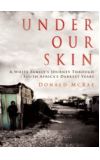
05 Jun 2012 12:45:24
This was, in fact, a good week for South Africa. No one died. No artists were jailed. The president's men were forced to make their argument in court. While much of the debate was base and opportunistic, the affair ultimately spoke more of a vibrant, noisy constitutional democracy than a thought-policed dictatorship.
There could be no more salutary reminder of this than reading Donald McRae's exquisitely framed memoir, Under Our Skin, recalling a not-so-distant era when people were dying, and being tortured, and being conscripted to fight in defence of a twisted ideology. Artistic expression and political expression really were a matter of life or death.
McRae, a white boy of British descent, grew up in a comfortable middle-class bubble. His narrative begins with a child's eye view – innocent, non-judgmental and decontextualised – of daily life under apartheid, capturing how the young observe injustice with mild curiosity rather than repulsion. More telling than harrowing accounts of atrocities is the casual, unthinking racism in the apartheid state's DNA. With studied blissful ignorance, McRae's father refers to black boys anonymously as "John", rather than learning their names, when hiring them to help with odd jobs. The family's black domestic servant is not allowed to use the same knives and forks or dining table. Many of the black people he meets are similarly unquestioning of the status quo.
This is also a father-and-son story. In his unfailingly crisp and understated prose, McRae recalls with great tenderness how his dad nursed him when he cut his face open on a metal bedstead. Yet this same man is among the silent majority whose actions, or non-actions, underpin state-sponsored segregation and terror. The book raises a question that has nagged anyone with a racist grandparent – to smile politely or to challenge ossified prejudice.
Thus Barack Obama famously said he could never disown his white grandmother – "a woman who helped raise me, a woman who sacrificed again and again for me, a woman who loves me as much as she loves anything in this world, but a woman who once confessed her fear of black men who passed by her on the street, and who on more than one occasion has uttered racial or ethnic stereotypes that made me cringe".
Politics invades the personal. Having painted a childhood not so different from British suburbia – the Beatles, cricket, girls – McRae recounts the creeping chill of military conscription, which saw white boys bullied and beaten by little Hitlers in preparation for futile border wars. When he declares himself a conscientious objector, his relationship with his father is torn apart. There is even a chance that he might be subjected to electric-shock treatment. Could his father stand by while a chunk of his brain is burned?
Ultimately McRae is sent for psychiatric treatment. Fortunately, his psychiatrist hits the nail on the head, comparing his situation to Joseph Heller's Catch-22. For apartheid South Africa is like a bizarre, bloated satire of a nation in which all logic is inverted. So it did for good men like Neil Aggett, a white doctor and anti-apartheid activist, tortured to death in detention.
But there is redemption here. McRae's father cannot escape a picture in his office at the national electricity provider: "Against a canvas of blue sky, giant cooling towers and gleaming electrical plant shimmered in the distance. And yet, curiously, an African mud hut in the corner of the photograph always caught his eye. It was a black home without electricity, and its contrast with the lavish new power station haunted him."
With the rebellious McRae already exiled in Britain, his father embarks on a programme to electrify South Africa's black townships, previously "Dickensian" places where people used coal fires for heat and candles for light. He becomes, in a quiet way, one of the heroes, "Mr Electricity".
Refreshingly, this book does not attempt to over-analyse white South African identity, in the vein of other literature and journalism that it is tempting to describe as the unbearable whiteness of being. As McRae acknowledges, South Africa's post-apartheid glow was short-lived, and a new set of complexities arose. Poverty, inequality and unemployment are rampant and more of that casual racism survives than many would like to admit. But it is equally clear there is no lost golden age to yearn for, no cause for a paralysing nostalgia.

